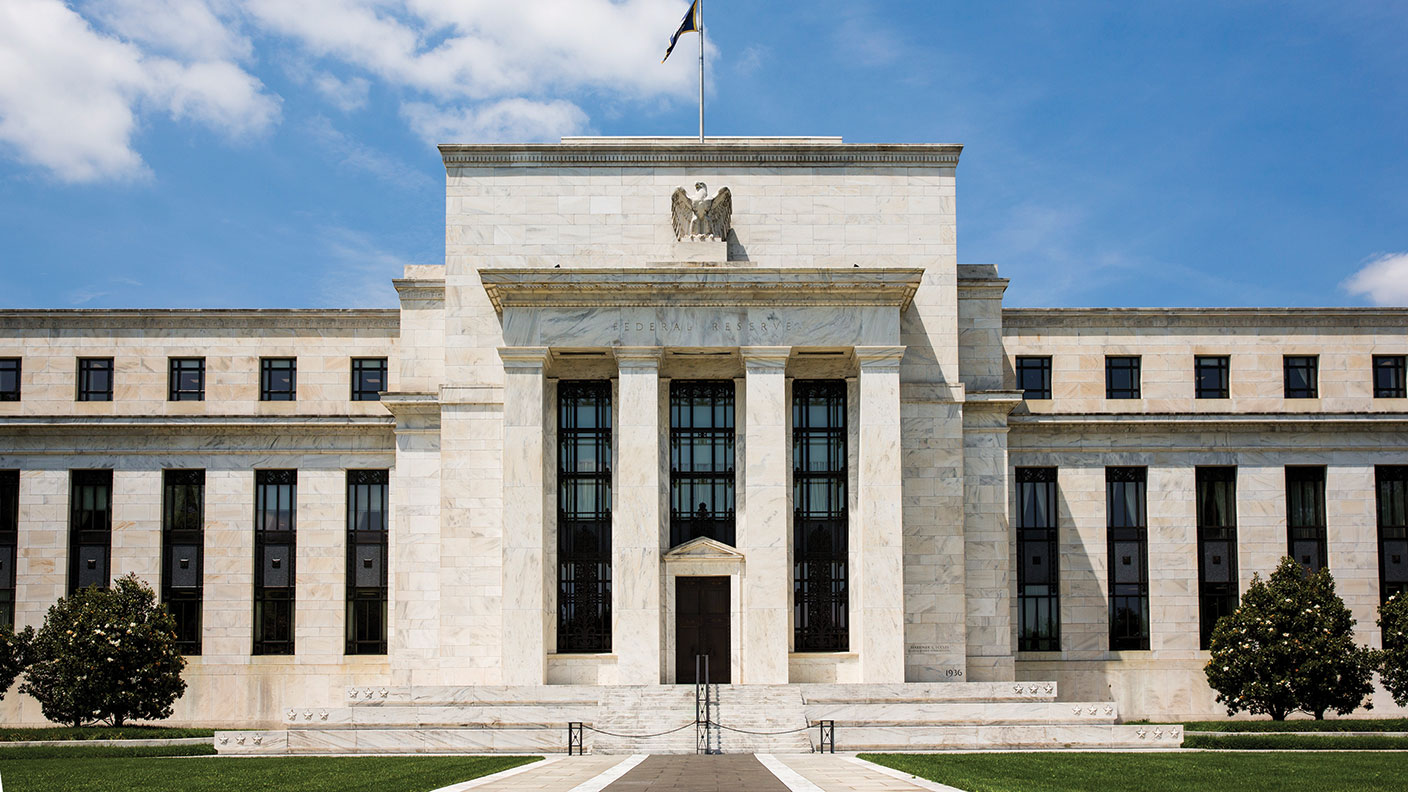Central banks can’t solve our current economic problems
Traditionally, as we hit recessionary times, central banks have lowered interest rates. But that’s not an option this time. If anyone can help dull the economic pain, it’s not the Bank of England, it’s the government. John Stepek explains why.


Get the latest financial news, insights and expert analysis from our award-winning MoneyWeek team, to help you understand what really matters when it comes to your finances.
You are now subscribed
Your newsletter sign-up was successful
Want to add more newsletters?

Twice daily
MoneyWeek
Get the latest financial news, insights and expert analysis from our award-winning MoneyWeek team, to help you understand what really matters when it comes to your finances.

Four times a week
Look After My Bills
Sign up to our free money-saving newsletter, filled with the latest news and expert advice to help you find the best tips and deals for managing your bills. Start saving today!
Today at noon, we get the Bank of England’s latest interest rate decision.
The main UK interest rate is currently sitting at 1.25%. Markets expect the Bank to raise that to 1.75%. That half-point increase would be the biggest rise since 1995 (and the Bank wasn’t even independent back then).
(For perspective, they were starting from a much higher rate at that point – the Bank rate was above 6%, while inflation was sitting at less than 3%.)
MoneyWeek
Subscribe to MoneyWeek today and get your first six magazine issues absolutely FREE

Sign up to Money Morning
Don't miss the latest investment and personal finances news, market analysis, plus money-saving tips with our free twice-daily newsletter
Don't miss the latest investment and personal finances news, market analysis, plus money-saving tips with our free twice-daily newsletter
The expectations for a half-point hike are driven mostly by the action of the Bank’s peers. The US Federal Reserve and the European Central Bank have both been raising rates more aggressively than expected. (The ECB raised them all the way to 0%!)
So some argue that the Bank should be raising rates aggressively, to keep up.
There’s a perfectly reasonable argument for all of this. Inflation is really high compared to interest rates. If it stays high, then inflation expectations go up too. If people expect inflation to stay high then it changes their behaviour. Same goes for corporations. Everyone starts acting as if inflation will stay high, and it becomes a self-fulfilling prophecy.
That’s the theory anyway. Personally speaking, I’m not convinced by the whole “expectations” idea, which falls into the wishy-washy “feelings” side of economics. People’s economic actions don’t stem from mood swings, they are bedded in “real” conditions and circumstances facing them on the ground.
If you start with that assumption, then the concrete problem with inflation being above a certain level is that it makes planning ahead much harder. This in turn makes decision-making throughout the economy more short-termist and therefore less efficient. You move from “just-in-time” to “just-in-case”.
And yes, that becomes a self-fulfilling prophecy too. But if you at least acknowledge that it’s based on what is fundamentally a mechanical problem in the real world, then you can think about how to address that problem. This explains why, for example, Walmart is struggling with inventory management right now, even though its expertise in inventory management must surely put it among the best in the world.
Central banks can no longer play the saviour
Anyway, there’s a bigger issue here.
The reality is that the Bank probably doesn’t have a great deal of choice. Having rates sitting at 1.25% when inflation is heading into double-digit territory is just untenable. And if the Bank doesn’t at least meet market expectations – no guarantee when Andrew Bailey is in charge – then that would send the pound lower, which would only exacerbate the problem.
But a rate rise to 1.75%, or 2%, or even 2.25% is not going to do a lot to make anything better for anyone.
The real problem is that, over the last 20 years or so, we have come to rely on central banks far too much to do all the heavy economic lifting. And during that period, they haven’t really been fighting inflation – they’ve been fighting deflation.
This means that when the economy has run into recessionary times, central banks have always been poised to cut interest rates, not raise them. None of that has stopped recessions from happening. But certainly during 2008 and the 2020 pandemic and countless brief market stumbles in between, cutting rates has been seen as a bit of a magic wand – not just for markets, but for the wider economy too.
We are now in a situation where central banks simply cannot help in this way. If they really want to stop inflation in its tracks, they’ll have to raise rates so high that they inflict a recession which is even harsher than the one which is more than likely already heading our way.
So what does all that mean? Well, once upon a time, we might have argued that you could just do nothing. Let the economy sort itself out. High energy prices will squeeze consumer demand. A recession will mean less competition for workers, which will keep a lid on wages. Getting interest rates to a point where they are a little more “normal” will help savings to balance out debt somewhat.
But after such a long time of getting used to someone coming along to “do something” when economic pain is on the horizon, I don’t think we’re going to see a laissez-faire attitude spring up now. Instead, the obvious candidate to “do something” is the government.
“Do something!”
The government, which will either be led by Liz Truss or Rishi Sunak, is definitely going to face calls to “do something” (indeed it already is) given how painful the energy squeeze is about to get.
As things stand, it’s hard to exaggerate how bad the shock looks like it could be. Households are facing a doubling of energy bills compared to what they’ve been used to. That is a huge amount of money and it will not be politically popular, to say the least.
Iain Martin in The Times (hardly a “big government” guy) goes so far as to argue that the pending energy crisis could “become a poll tax moment”.
So what does that mean in practice? In practice, it means intervention. On the upside, you might find that you get more help with your energy bills this year (and maybe next) than is already on the cards. On the downside, that money is going to have to come from somewhere.
You need only look at headlines in recent days as companies in the energy sector have reported record profits. You can debate the financial literacy of all this for days (there isn’t any). But that’s not really useful to an investor.
I suspect that further windfall taxes of some sort are likely to be considered (although they’re probably more likely under Sunak). And that’s under a right-leaning government.
It doesn’t mean you should avoid energy production – we’re going to need a lot more of it after all. But it does mean it makes sense to be diversified both within and outside of the UK. Dominic suggested some wide-ranging funds for playing oil here.
Get the latest financial news, insights and expert analysis from our award-winning MoneyWeek team, to help you understand what really matters when it comes to your finances.

-
 Should you buy an active ETF?
Should you buy an active ETF?ETFs are often mischaracterised as passive products, but they can be a convenient way to add active management to your portfolio
-
 Power up your pension before 5 April – easy ways to save before the tax year end
Power up your pension before 5 April – easy ways to save before the tax year endWith the end of the tax year looming, pension savers currently have a window to review and maximise what’s going into their retirement funds – we look at how
-
 How a dovish Federal Reserve could affect you
How a dovish Federal Reserve could affect youTrump’s pick for the US Federal Reserve is not so much of a yes-man as his rival, but interest rates will still come down quickly, says Cris Sholto Heaton
-
 New Federal Reserve chair Kevin Warsh has his work cut out
New Federal Reserve chair Kevin Warsh has his work cut outOpinion Kevin Warsh must make it clear that he, not Trump, is in charge at the Fed. If he doesn't, the US dollar and Treasury bills sell-off will start all over again
-
 'Investors should brace for Trump’s great inflation'
'Investors should brace for Trump’s great inflation'Opinion Donald Trump's actions against Federal Reserve chair Jerome Powell will likely stoke rising prices. Investors should prepare for the worst, says Matthew Lynn
-
 How have central banks evolved in the last century – and are they still fit for purpose?
How have central banks evolved in the last century – and are they still fit for purpose?The rise to power and dominance of the central banks has been a key theme in MoneyWeek in its 25 years. Has their rule been benign?
-
 'Governments are launching an assault on the independence of central banks'
'Governments are launching an assault on the independence of central banks'Opinion Say goodbye to the era of central bank orthodoxy and hello to the new era of central bank dependency, says Jeremy McKeown
-
 Do we need central banks, or is it time to privatise money?
Do we need central banks, or is it time to privatise money?Analysis Free banking is one alternative to central banks, but would switching to a radical new system be worth the risk?
-
 Will turmoil in the Middle East trigger inflation?
Will turmoil in the Middle East trigger inflation?The risk of an escalating Middle East crisis continues to rise. Markets appear to be dismissing the prospect. Here's how investors can protect themselves.
-
 Federal Reserve cuts US interest rates for the first time in more than four years
Federal Reserve cuts US interest rates for the first time in more than four yearsPolicymakers at the US central bank also suggested rates would be cut further before the year is out